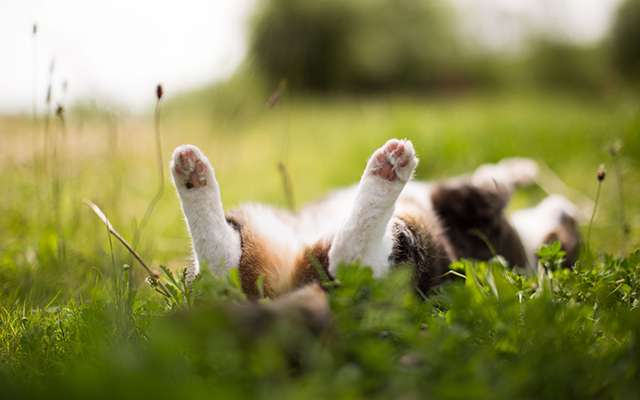By Valerie Trumps
Some cats are naturally stressed and anxious as part of their demeanor, while others save their freak-outs for car trips and vet visits. This leaves many pet owners wondering how to calm a cat to them a little stress relief in any situation. Fortunately, effective remedies are available that are both natural and easy to administer. Try these herbs and flower essences to help calm down your cat.
Catnip
Why give a substance known to rile up Fluffy in an effort to try and calm her down instead? The key to using catnip for relaxing your kitty is to give it to her about 15 minutes prior to the stressful event, such as the dreaded veterinary trip. After she hangs from the ceiling and bolts around the room at lightning speed, she will be worn out and exceptionally calm.
Valerian
This herb is said to mimic catnip, with one significant difference. After her initial crazy-fest, not only will she be very calm, she is also likely to sleep. This herb is also used for humans as a remedy for insomnia and has the same effect on felines. The euphoria induced by Valerian will seriously chill her out and make her more docile than you could ever imagine.
Chamomile
Many people drink chamomile tea before bed to help them relax, and the same anti-anxiety properties are just as effective for cats. However, the dried flowers are a better way to expose your cat to its stress relief benefits. Studies in animals have shown that chamomile contains substances that act on the same parts of the brain and nervous system as anti-anxiety drugs do. The effect promotes relaxation and reduces stress.
Hops
My cat-parent friends and I have a long-running joke that once the humans have left the house, Fluffy breaks out the kitty beers. Maybe an indirect reason for hops as the main ingredient of lager is its calming effects. But don’t soothe your feline’s nerves by giving her a sip of ale; the dried flowers are more effective and better for her liver.
Bach Rescue Remedy
Humans have known the benefits of this flower essence combination in relieving stress and anxiety and, fortunately, it can also be used with cats (and dogs). Though technically not an herb, its reliable benefits bear a mention in any list of stress-reducing tactics. Perhaps the best feature of Bach Rescue Remedy is its immediate effectiveness. This formulation is great when you need to calm down your cat pronto. Be sure to purchase the alcohol-free version for Fluffy.
How to Administer the Herbs to Calm Your Cat
Herbs come in many forms – tinctures, dried flowers or leaves, essential oils, and teas are just a few. However, essential oils should never be used on cats due to their liver functioning, which makes it difficult (if not impossible) to break down the compounds and can lead to serious illness – even death.
Due to their delicate systems, the dried form of herbs is safest for kitty use. To prevent her from eating the leaves and flowers, put them inside of a tube collar or make a tiny toy “pillow” with the herbs inside. Kitty will still benefit from the relaxing qualities and be kept safe from over-ingesting them.
If you prefer a tincture, make sure to buy one professionally created by a reputable pet product company with holistic (also known as naturopathic) veterinarians on staff. Even with the best intentions, a home-mixed tincture can be extremely dangerous to your cat. Drops of your purchased tincture can be put in her water for extended calming or squeezed into her mouth for immediate relief.
Teas are best left to humans whose systems are more tolerant of steeped herbs.
See Also
Image: Shutterstock
Stress and anxiousness are common in cats. While it may be natural for some cats, others get stressed if exposed to specific conditions such as visits to the vet, car drives, and even the presence of new members in the family.
Surprisingly, a few herbs and flowers may be just what you need to calm your pet’s nerves. The good news is that these herbs are not only effective, they are also healthy and you do not have to dig deep into your pockets to purchase them either.
Valerian
For best results, administer the herb fifteen minutes before the expected stressful event. Soon after the initial shock, the cat will calm down. Don’t get surprised if she falls asleep soon afterward. The herb is also administered to humans who have difficulties sleeping and has the same effect on cats as well. The herb induces euphoria that makes you cat more docile than you could imagine.
Catnip
The key to using this herb to calm kitty is to administer it about 15 minutes before the stressful occurrence, just like valerian. Soon after, she’s done with running around the room at high speed, she will be worn out and settle down in a calm demeanor.
Chamomile
Chamomile tea is mostly used by people to calm their nerves and mostly before they go to bed. The same effects that the herb has on humans are also observable in dogs that have had the herb. Flowers from chamomile are however used for more desirable results. Chamomile has substances that are known to act on similar parts of the brain and nervous system and as a result, helps to reduce stress and promote relaxation in your cat.
Bach rescue remedy
The benefits of this herb when it comes to relieving stress and anxiety are something that humans are familiar with. The good news is that the flower essence can be used to achieve the same results with your cat and dogs as well. And even it’s not exactly an herb, it qualifies to be on this list and similar ones due to its immediate effectiveness in reducing stress levels. It’s a great solution when you want to calm down your cat as soon as yesterday.
Hops
The calming effect of hops is probably the main reason behind its use in a lager. This is not to say that you should give your cat a sip of the beer you have been keeping in your fridge. Dried hops flowers will calm her just fine. They are also good for the liver.
How to administer herbs to cats
Herbs come in various forms, including flowers, teas, essential oils and tinctures. Essential oils should never be administered to cats though, as this affects the functioning of the liver. The safest form of herbs to use for cats is dried herbs. Tinctures are not recommended for cats as well.
Do note that while herbs can be beneficial, not all cats display positive reactions and at times, any reaction, to the herbs. If you want the best results to reduce anxiety levels in your cat, it’s best to take her to a veterinary clinic in Briarcliff Manor, New York to get the best advice.
Thanks to their sensitive natures, cats are more prone to stress and anxiety than many other animals. From California poppy to valerian, these herbs help calm anxious kitties.
Anyone who has lived with a cat is aware that felines are uniquely sensitive creatures. They seem much more keenly tuned into their environments than we or even our dogs are. The smallest change in a cat’s routine – how the furniture has been rearranged, or who just dropped by for dinner — can result in anxiety. And unlike virtually any other animal, Kitty prefers to operate under her terms only, which raises the anxiety bar even higher, especially when her expectations don’t pan out. Luckily, there are many ways to calm anxiety in cats — including the herbs outlined in this article.
Different herbs for different circumstances
Calmative herbs can be generally described as those that help relieve anxiety and bring about a calmer, more relaxed state of being. However, it’s important to realize that no two calmative herbs are entirely alike.
1. Valerian root (Latin name)
Thanks to the antispasmodic and carminitive activities of its saponin constituents, valerian root is especially well-suited to cases where high anxiety manifests in vomiting. Cats are well known for holding tension in the gut, and for this, ten to 20 drops of a glycerin-based valerian tincture piped directly into the mouth will usually bring fast relief.
 2. Catnip (Nepeta cataria)
2. Catnip (Nepeta cataria)
If the cat does not tolerate valerian, a similar dose of catnip glycerin tincture may do the trick. Don’t worry about Kitty getting looped-out the way he does with his catnip mouse — the euphoric effects of catnip (which are good in their own right) only occur when aromatic nepetalactones from the herb activate the cat’s accessory olfactory system inside her nose. When ingested, catnip does not induce euphoria, but serves as a general calming agent that also helps relieve intestinal gas and bloating, the byproducts of a nervous gut.
3. Lemon balm (Melissa officianlis)
This herb offers similar activities in the gut, and will induce a subtle calming effect. Science suggests lemon balm may also help slow an overactive thyroid — a problem suffered by many cats. In theory, the herb inhibits thyroid-stimulating hormone (TSH) uptake at TSH receptors. However, if you suspect your cat may have thyroid disease, a trip to the veterinarian is warranted, as hyperthyroidism can lead to serious, even life-threatening health problems. Lemon balm may also interfere with certain thyroid drugs.
4. Passion flower (Passiflora incarnata)
The chemicals in passionflower have calming, sleep-inducing, and muscle spasm-relieving effects, but I find it’s best for helping ease the mind during bouts of jealousy, separation anxiety, fear or grieving. Give ten drops of an alcohol-free tincture, by mouth, up to twice daily.
 5. Skullcap (Scutellaria laterifolia)
5. Skullcap (Scutellaria laterifolia)
This is the first herb I turn to for “nervous jitteriness”; situations in which an animal is literally trembling with anxiety, or seems hypersensitive to touch – such as when you touch your cat’s back and her skin crawls, or she jumps. Skullcap is also frequently used as a direct replacement for valerian, which tends to heat up certain individuals. Some of the veterinarians I work with use skullcap to help reduce the intensity and frequency of epileptic seizures. There are many species of skullcap, and some have quite different chemistries, so be sure the product or plant you are using is Scutellaria laterifolia, which is the primary commercial species in North America.
6. California poppy (Eschscholzia californica)
This is among the first herbs to consider when your cat’s anxiety is associated with pain. Unlike whiny humans who deal with pain by popping analgesic or anti-inflammatory pain pills, cats cope with their aches and pains by curling up and going to sleep. Enter California poppy. Unlike its Asian cousin the opium poppy (Papaver somniferum), the California poppy does not contain any opiates, but it does have some very mild opiate-like properties that make it useful for safely and reliably bringing comfort to a pain-agitated feline. Look for an alcohol-free tincture formula made from the entire flowering plant. Use in small frequent doses for the best effects. For Kitty, this equates to 0.25 ml of the tincture, once every two hours until a restful state is established.
Before giving anything new to your cat, including herbs, it’s always a good idea to schedule a veterinary check-up to make sure her stress and anxiety isn’t being caused by a physical problem. It’s also important to consider how her diet may be contributing to her anxiety (see sidebar above). Once any medical and nutritional issues have been addressed, reach for the above herbs and see how effective they can be for calming your stressed-out kitty!



